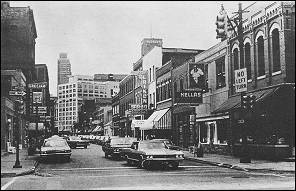Dan Georgakas
Dan Georgakas
Elegy for Greektown

When I saw the olive oil had been diluted in what was once the most simpatico of Greektown restaurants, I heard the death rattle of Greektown. The first major casualty was the old Kozani Cafe (today’s Pink Panther) where there used to be wooden pegs for coats and old men would sit on an ouzo all night watching the young guys dance and fight. There were no belly dancers in those days, just good hill and country Greek music like you have a hard time finding even in Athens. One old “theo” played an instrument similar to Zorba’s except on Thursdays when he went with a young whore who worked the area regularly. That was during the days before urban renewal knocked out most of the houses where the pensioners lived and destroyed the interesting Greek-Negro community of the area. That was before the funeral home had to relocate. That was when the musicians could find work in their own city. That was when Big Mike ran the Laikon and the cops spent a frustrating afternoon tracking down a tip linking a Mr. Papagalous with a murder (Mr. Papagalous was a parrot). That was when the Greeks played most of the bar but in the backrooms and there was no junior executive trade jamming into the Lafayette Bar causing a nervous Sam to turn away tieless ethnic trade. The barber shop remains. The newspaper still publishes. Grocery stores carry on. A few tough coffeehouses of the old dozen. But the entrepreneurs are modernizing. The salads shrink, the price of feta cheese (imported from Italy these days) goes up. There are signs in the windows to guarantee in print that you are a friend as well as a customer. The city fathers have become aware of their tourist gem and the basest aspect of the Greek merchant personality has responded to civic duty. Coney island joints (symbol of bastardized Greek-American palate) have appeared. One thanks the Olympic gods for the Stemma Bakery which still produces the raw materials needed for homemade pastries. But nothing has been the same since Greekness was officially discovered during the time of Never on Sunday. I won’t bother to tell you that Pireaus whores aren’t really like that, nor Greek villagers like the animals you saw in Zorba. A certain stereotype of Greekness has been fashioned and now the community is coming to believe in it even as the stereotype is exploited. A few merchants grow wealthier but there is no place for the young guys to hang out at anymore. The old-timers are dying off at a rapid rate and many prefer to remain home rather than gather in the now barren kaffenions. The houses they might have moved into in other years are now parking lots and deserted fields. Part of the process is that of the inevitable and perhaps justified accommodation of a minority culture into the American malaise. Even under the best conditions, Greektown could not be the more Eastern than American quarter it was during the initial wave of immigration, yet the recent decay of Greektown is not a process of the melting pot but of the garbage pail. The physical attack has been thorough, destroying buildings on all sides of the one remaining Greek street, sparing the Greek church (at least temporarily) only because of vigorous protest. The spiritual decay is part of that general process by which Americans tend to become more and more the distorted image they think others have of them. Any of your hyphenated friends might reveal a parallel cultural experience, So let’s plant the goddam little flower boxes next to the parking meters. Let’s change our name from Leonides to Lincoln. Let’s have the city condemn the unprofitable old joints for health violations. Let’s fill the street with well-meaning enthusiasts for the Greek madness. America, you are a tough tough bitch and it will take a lot more than a smack in the mouth to set you right.
Mar 5, 2023 Read the whole text...
Dan Georgakas
Hell No, We Won’t Pay
Uprisings in Greece
The international press is constantly writing about the economic crisis in Greece. Economic pundits speculate less about whether or not Greece will default but in what manner and when. Absent from these considerations is the massive popular revolt in Greece against the Draconian measures already in place. Totally absent from mainstream commentary is the effect on European stability the mass resistance developing in Greece might have if replicated in other EU nations. The massive marches in Greece have gotten considerable coverage, but far more significant are the unreported successes of the I Won’t Pay movement and the communal revolt in Keratea, a small seaside town 25 miles southeast of Athens.
Nov 6, 2013 Read the whole text...
Dan Georgakas
Three Anarchist Rebellions on Film
Hundreds of films take on anarchist themes in some manner, but only a handful deal with anarchist governance. Three of the most interesting of these are, Alexander the Great (Megalexandros, 1980, Greek), Viva Zapata! (1952, United States), and Rebellion in Patagonia (La Patagonia Rebelde, 1974, Argentina).
Oct 17, 2013 Read the whole text...
Dan Georgakas
Z — An Interview with Costa-Gavras
NOTE: Costa-Gavras, the director of “Z,” was born in Athens, Greece in 1933. In 1964 he made his first film, “The Sleeping Car Murders” and since has completed “One Man Too Many” and “The Avowal.” While in New York for the opening of “Z,” he was interviewed by Dan Georgakas, a writer who is active in the anti-junta movement, a past contributor to the Fifth Estate who was in Greece in 1963 during the Lambrakis affair, and Gary Crowdus, editor of Cineaste Magazine.
Jul 23, 2022 Read the whole text...
